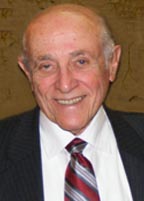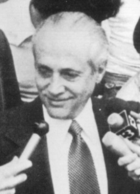Marvin Mandel facts for kids
Quick facts for kids
Marvin Mandel
|
|
|---|---|
 |
|
| Chair of the National Governors Association | |
| In office June 4, 1972 – June 3, 1973 |
|
| Preceded by | Arch A. Moore Jr. |
| Succeeded by | Daniel J. Evans |
| 56th Governor of Maryland | |
| In office January 7, 1969 – January 17, 1979* |
|
| Lieutenant | Blair Lee III |
| Preceded by | Spiro Agnew |
| Succeeded by | Harry Hughes |
| Speaker of the Maryland House of Delegates | |
| In office February 1964 – January 1969 |
|
| Preceded by | A. Gordon Boone |
| Succeeded by | Thomas Hunter Lowe |
| Personal details | |
| Born | April 19, 1920 Baltimore, Maryland, U.S. |
| Died | August 30, 2015 (aged 95) Compton, Maryland, U.S. |
| Political party | Democratic |
| Spouses | Barbara Oberfeld (1941–1974) Jeanne Blackistone Dorsey (1974–2001) |
| Education | University of Maryland, College Park (BA) University of Maryland, Baltimore (LLB) |
| *Blair Lee III served as Acting Governor from June 4, 1977 – January 15, 1979 | |
Marvin Mandel (born April 19, 1920 – died August 30, 2015) was an American politician and lawyer. He served as the 56th Governor of Maryland. His time as governor was from January 7, 1969, to January 17, 1979. For part of this time, Lt. Governor Blair Lee III served as acting governor.
Mandel was a member of the Democratic Party. He was Maryland's first, and so far only, Jewish governor. Before becoming governor, Mandel was the Speaker of the Maryland House of Delegates. He held this role from 1964 to 1969. He had also been a delegate since 1952.
Mandel became Governor of Maryland on January 7, 1969. This happened because the previous governor, Spiro Agnew, was elected Vice President of the United States. At that time, Maryland did not have a lieutenant governor. So, the state legislature voted to choose the next governor. The office of lieutenant governor was created later in 1970.
Early Life and Education
Marvin Mandel was born and grew up in a Jewish family in Baltimore, Maryland. He went to the Baltimore City Public Schools. He graduated from Baltimore City College. This was a special school that prepared students for college.
He earned a Bachelor of Arts degree in 1939. This was from the University of Maryland at College Park. In 1942, he received a Bachelor of Laws degree. This degree was from the University of Maryland Law School. He even won an award for his work in a practice court case.
Political Journey
Mandel first entered public office in 1952. He was elected to the Maryland House of Delegates. He represented the northwestern part of Baltimore City. He served several terms during a time of big changes. This included the Civil Rights Movement.
In January 1963, he was chosen as Speaker of the House of Delegates. He held this important position until January 1969. When Governor Agnew resigned, Mandel was elected governor. The members of the General Assembly voted for him.
In his first speech, he famously said, "Make no mistake about it, we intend to govern!" This showed he was serious about his new role. After serving almost two years of Agnew's term, he was elected by Maryland voters. He won a full four-year term in November 1970. He was re-elected in November 1974.
Governor's Achievements
Mandel's time as governor brought many important changes. He reorganized the executive branch of the Maryland state government. Many different offices and agencies were combined. They were grouped into twelve main departments. Each department was led by a secretary. These secretaries reported directly to the governor. This made the government more organized.
Under Mandel, Maryland's mass-transit system was also developed. Plans for two urban subway networks began in 1969. One network was for the Baltimore area. The other was for the Washington, D.C. area. This helped people travel more easily.
A statewide public school construction program was also started. The goal was to make sure all students had equal access to good schools. This meant equal buildings, supplies, and teachers. This program helped students from kindergarten through high school.
The state government became simpler and more efficient. New departments were created. These included departments for the environment, general services, and natural resources. There was also a department for public safety and correctional services.
Mandel also wanted to help Maryland's economy grow. He aimed to attract companies from other countries to the state. In 1972, he chose Philip Kapneck to lead this effort. Kapneck opened an office in Brussels, Belgium. In 1974, Mandel named him Maryland Trade Ambassador. This effort was very successful. It helped create many jobs in Maryland over the next 40 years.
Family Life
Marvin Mandel married Barbara Oberfeld on June 8, 1941. They had two children, Gary and Ellen. In 1973, Mandel announced he was separating from Barbara. He later married Jeanne Blackistone Dorsey in 1974.
Jeanne Dorsey Mandel sometimes took on official duties as the "First Lady" of the state. She passed away on October 6, 2001. They had been married for 27 years.
After his time as governor, Mandel continued to be involved in public service. He chaired a commission on state government efficiency starting in 2003. He also served on the Board of Regents for the University System of Maryland.
Marvin Mandel passed away on August 30, 2015. He was 95 years old. He was later honored by being inducted into the Jewish Community Center of Greater Baltimore Hall of Fame.
See also
 In Spanish: Marvin Mandel para niños
In Spanish: Marvin Mandel para niños
- List of people pardoned or granted clemency by the president of the United States
 | Isaac Myers |
 | D. Hamilton Jackson |
 | A. Philip Randolph |


